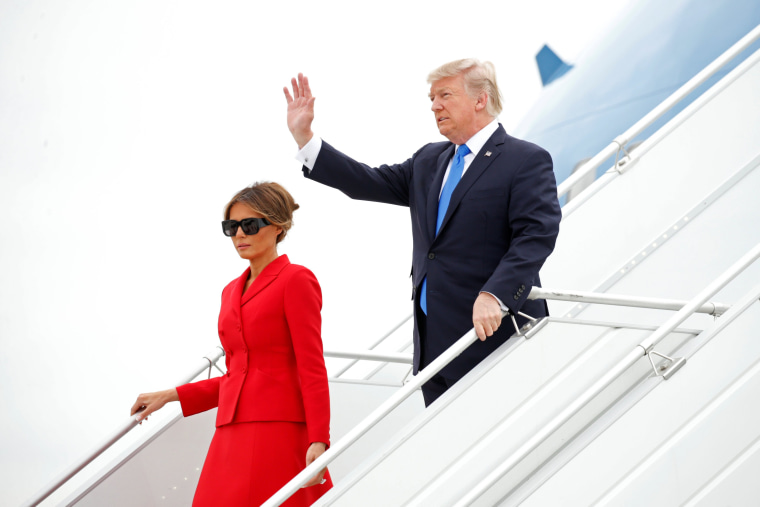PARIS — President Donald Trump has certainly had his differences with Emmanuel Macron, including clashing on climate change and exchanging surly handshakes with the younger French president.
The pair will try to put all that aside, however, and instead find some common ground when they meet Thursday ahead of France's Bastille Day celebrations.
Trump arrived in the French capital on an overnight flight from Washington and will discuss Syria and broader counterterrorism strategies with Macron. On Friday, he will then participate in the Bastille Day parade.
Air Force One landed just after 8:30 a.m. local time (2:30 a.m. ET) on a cool, overcast day in the French capital. The president wore a suit and blue tie and the first lady a red dress with a flowing skirt and high-heeled pumps.
Trump then traveled to the U.S. Ambassador’s residence, a French mansion with lush, well-kept grounds and staff already rushing about ahead of a big two days.
First Lady Melania Trump meanwhile visited Hôpital Necker - Enfants Malades, a sprawling children's hospital in the center of Paris, where she chatted with children in French, one of the five languages she speaks, according to her spokeswoman, Stephanie Grisham.
Later Thursday, Trump and Macron will hold meetings and a press conference. During the latter the U.S. president may face tough questions about emails revealing that his eldest son welcomed the prospect of receiving Russian government support in last year's presidential campaign against Hillary Clinton.
Then in the evening, the French president and his wife, Brigitte Macron, will host the U.S. president, the first lady and their delegation for a dinner at the famous Le Jules Verne restaurant, which enjoys stunning views from its perch on the second level of the Eiffel Tower.
This all tees up the Trumps attending the celebrations for Bastille Day, France's most important national day that marks a key turning point in the French Revolution in 1789.
The trip is an attempt to build bridges after Trump's decision last month to withdraw the U.S. from the Paris climate accord sparked outrage across Europe.
There are also several protest marches planned for Thursday and Friday, one of which is calling for a "No Trump Zone" in one of the city's central squares.
Related: Wray Says Russia Probe Not a ‘Witch Hunt,’ Pledges ‘Independent’ FBI
The visit to Paris could offer Trump a well-timed distraction from the controversy surrounding Donald Trump Jr.'s email revelations.
It will mark the 100th anniversary of America's entry into World War I when Trump visits U.S. troops. The president will also be the guest of honor at Friday's Bastille Day events — a celebration of French national pride. White House officials are casting it as a celebration of the U.S.-French military alliance — both then and now.
Trump is visiting a city he has repeatedly disparaged. When he announced his decision on the climate agreement, Trump said he was "elected to represent the citizens of Pittsburgh, not Paris." And he's repeatedly said the city has been ruined by the threat of terrorism, which he ties to immigrants.
"Paris isn't Paris any longer," he said in February.
But counterterrorism issues give Macron and Trump the potential for a strong working relationship.
Macron's national security pitch hasn't differed drastically from Trump's. On Syria, he argues for intervention, saying that President Bashar al-Assad is a threat to Syria and ISIS is a threat to France.
Related: Hottest Question on the Hill: Would You Meet With a Russian?
France has been plagued in recent years by extremist attacks. During last year's Bastille Day celebrations, a 19-ton cargo truck deliberately plowed into crowds in Nice, killing more than 80 people.
Macron supports intervention against Syria's government in response to its use of chemical weapons and could prove an important ally as the Trump administration seeks to increase pressure against Assad.
But in doing so, they'll need to tackle the issue of Russia's support for Assad, something Trump has only passively acknowledged.
Kirstin Donnelly reported from Paris, Alexander Smith reported from London

